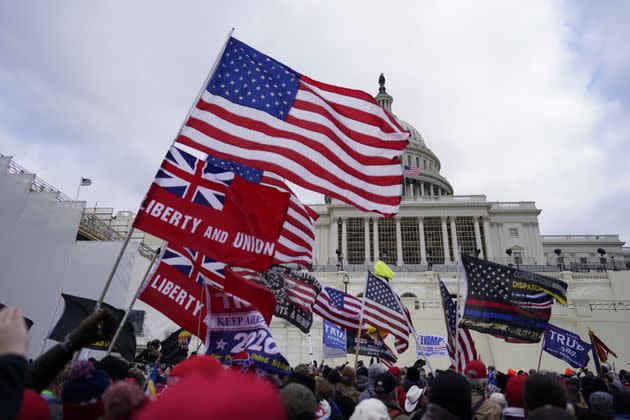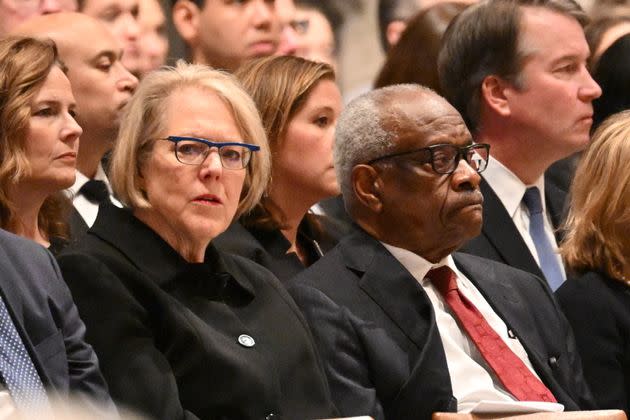Supreme Court Conservatives Appear Skeptical Of The Law Used To Charge Hundreds Of Jan. 6 Insurrectionists
- Oops!Something went wrong.Please try again later.
- Oops!Something went wrong.Please try again later.
The Supreme Court appeared incredibly skeptical of how a law has been used to charge hundreds of participants in the attack on Jan. 6, 2021, in arguments on Tuesday.
The case came to the court from a challenge brought by Joseph Fischer, who was among the mob that stormed the Capitol on Jan. 6. Among other charges, he was accused of violating a provision in a 2002 accounting reform law that prohibits anyone who “corruptly … obstructs, influences, or impedes any official proceeding, or attempts to do so.”
But in his challenge, Fischer argued that the law was not meant to apply to situations like the Jan. 6 insurrection. The Department of Justice has already charged at least 330 participants in the attack, including former President Donald Trump, with violating this provision.
If the court rules in favor of Fischer, it would likely lead to the dismissal of this charge from his case, as well as its dismissal for hundreds of other defendants — including Trump. That charge against Trump was brought by special counsel Jack Smith as part of a four-count indictment for alleged crimes committed in pursuit of overturning the 2020 election.
During arguments, the court’s conservative justices appeared hostile to the use of this provision in the context of Jan. 6, suggesting that the government’s interpretation of the provision was overly broad. Liberal Justice Ketanji Brown Jackson also seemed to question whether the government’s theory about how to apply this provision could criminalize other activity, like protests and disturbances, that were not as violent or disruptive as the insurrection.
The arguments hinged on how to interpret the provision, officially known as 1512(c)(2), of the 2002 Sarbanes-Oxley Act. Passed in the wake of the Enron and Arthur Andersen accounting scandals, the law sought to close numerous loopholes and gaps in obstruction codes that protected the destruction or alteration of documents, particularly regarding financial fraud.

Lower courts have been divided on how to interpret the use of the word “otherwise” that separated the provision in question from the provision that preceded it. The full text of the law shows this separation (emphasis added):
(c) Whoever corruptly—
(1) alters, destroys, mutilates, or conceals a record, document, or other object, or attempts to do so, with the intent to impair the object’s integrity or availability for use in an official proceeding; or
(2) otherwise obstructs, influences, or impedes any official proceeding, or attempts to do so,
shall be fined under this title or imprisoned not more than 20 years, or both.
The question before the Supreme Court is whether the word “otherwise” meant “in a similar manner” — as a district court judge who initially dismissed the charge against Fischer found — or “in a different manner” — as a divided appeals court later ruled.
If “otherwise” means “in a similar manner,” then the provision used to charge the Jan. 6 defendants would combine with the preceding provision’s reference to records, documents or other objects.
This reading would lead to the dismissal of Fischer’s charge, as he was not attempting to alter, destroy, mutilate or conceal a document when he invaded the Capitol and allegedly assaulted a police officer, his lawyer, Jeffery Green, argued.
The court’s conservative justices appeared to favor this reading of the statute, although they spent much of their time discussing hypothetical applications of the law.
Using an array of examples involving liberals or leftists engaging in activity that was disruptive of official proceedings, the conservative justices pressed Solicitor General Elizabeth Prelogar, arguing on behalf of the government, on the limits of the Justice Department’s use of 1512(c)(2).
“There have been many violent protests that have interfered with proceedings. Has the government applied this provision to other protests in the past?” Justice Clarence Thomas, whose wife, Ginni Thomas, attended the “Stop the Steal” rally on Jan. 6 that precipitated the insurrection, asked.
Justice Neil Gorsuch asked if the law applied to a person pulling a fire alarm prior to a congressional vote, alluding to Rep. Jamaal Bowman’s (D-N.Y.) similar action in September last year. What if five protestors interrupted Supreme Court arguments and caused a delay, Justice Samuel Alito wondered, alluding to a 2015 incident where campaign finance reform activists shouted protests during arguments. Or could the law apply to protestors blocking bridges — as antiwar protestors did in San Francisco on Monday — from Virginia to Washington in order to stop lawmakers from getting to a particular vote, Alito asked.

Prelogar rebutted these hypotheticals by arguing that the government is required to show that a person acted with corrupt intent and with a necessary connection to a specific proceeding in order to bring such charges. She added that charges would not be brought for minimal disturbances, especially where a person could not be shown to be acting with criminal intent.
Jackson also addressed the fear of an overly broad use of the statute, saying that she was “struggling with leaping from” the document focus of 1512(c)(1) to the broad interpretation by the government of 1512(c)(2) encompassing “all obstruction in any form.”
Jackson appeared to seek a middle ground by positing that the court could limit the scope of the provision in question without leading to the dismissal of charges against Jan. 6 participants. Since the insurrectionists were seeking to delay, impede and possibly steal or destroy the electoral vote certificates, wouldn’t a document-related interpretation of the statute allow many of these prosecutions to go forward, Jackson asked.
“Yes, these would likely be viable charges,” Prelogar said.
Jackson was not alone in raising the question of whether all charges would be void if the court reached a more limited decision that partially sided with Fischer. Justice Amy Coney Barrett, a conservative, also raised this question early in arguments.
“Let’s imagine that we do agree with you,” Barrett said to Fischer’s lawyer, Green. “On remand, do you imagine that the government could take a shot at proving that your client actually did try to interfere with … or obstruct evidence because he was trying to obstruct the arrival of the certificates — arriving to the vice president’s desk for counting?”
Green disagreed with this theory.
“This statute prohibits operation on specific evidence in some way, shape or form,” Green said. “Attempting to stop a vote count or something like that is a very different act than actually changing a document, altering a document or creating a fake new document.”
By the end of arguments, it appeared that the justices would, in some fashion, side with Fischer and restrict the government’s use of 1512(c)(2) in the Jan. 6 prosecutions. The only question is how they would do so.
A narrower ruling following Jackson and Barrett’s lead could preserve a possible pathway for the government to continue some prosecutions, so long as it can prove intent to impede the certificates. A broader ruling, as the other conservatives seemed to be looking for, would likely lead to the dismissal of hundreds of charges brought against insurrectionists — including Trump.
The court will rule on the case by June 30.
